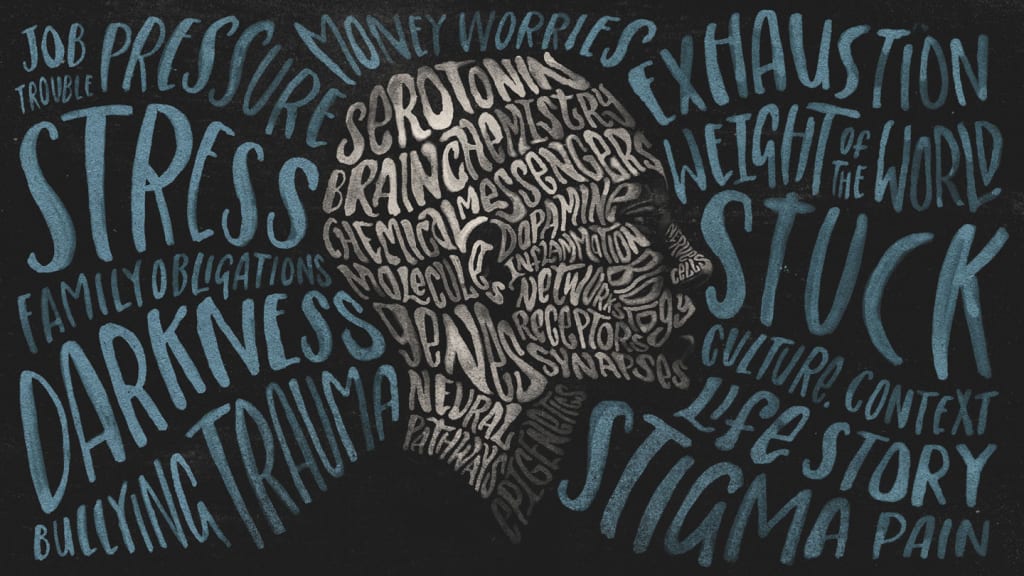Understanding Depression: Shedding Light on a Silent Battle
DEPRESSION

Depression, a mental health disorder affecting millions worldwide, remains an enigma despite decades of research and growing public awareness. Its impact extends far beyond fleeting sadness, infiltrating all aspects of a person's life. This article aims to shed light on depression, exploring its causes, symptoms, and available treatment options, with the hope of fostering understanding and empathy for those affected by this silent battle.
Defining Depression:
Depression is a mood disorder characterized by persistent feelings of sadness, hopelessness, and a loss of interest or pleasure in activities. It goes beyond the ordinary ups and downs of life, impairing one's ability to function optimally in daily tasks, relationships, and overall well-being. It can affect anyone, regardless of age, gender, or background, and may occur as a result of various factors.
Causes and Contributing Factors:
Depression is a complex condition, influenced by a combination of biological, psychological, and environmental factors. While the exact causes are not fully understood, several contributing factors have been identified. Genetic predisposition, chemical imbalances in the brain, traumatic life events, chronic stress, social isolation, and certain medical conditions can all play a role in the development of depression.
Recognizing the Symptoms:
Identifying depression can be challenging as symptoms can manifest differently in individuals. Common signs include persistent feelings of sadness, lack of energy, changes in appetite and sleep patterns, difficulty concentrating, a loss of interest in previously enjoyed activities, feelings of guilt or worthlessness, and even thoughts of self-harm or suicide. If these symptoms persist for more than two weeks, it is crucial to seek professional help.
Seeking Help and Treatment Options:
Reaching out for help is a crucial step in managing depression. Seeking support from mental health professionals, such as therapists or psychiatrists, can provide individuals with the guidance and tools needed to navigate their journey towards recovery. Treatment options may include psychotherapy, medication, lifestyle modifications, and support groups. It is essential to remember that treatment plans vary for each person, and what works for one may not work for another.
Supporting Individuals with Depression:
Support from loved ones can make a significant difference in an individual's recovery from depression. Expressing empathy, listening without judgment, and offering reassurance can provide a sense of comfort and validation. Encouraging them to seek professional help and accompanying them to appointments can help break down barriers and stigma surrounding mental health. Additionally, creating a safe and understanding environment where they can openly express their feelings can foster healing and resilience.
The Importance of Self-Care and Well-being:
In addition to professional support, self-care plays a vital role in managing depression. Engaging in activities that bring joy, maintaining a healthy lifestyle with regular exercise and a balanced diet, practicing relaxation techniques like meditation or yoga, and ensuring adequate sleep are all essential aspects of self-care. It is also crucial to prioritize self-compassion and avoid self-blame, understanding that depression is an illness that requires care and treatment.
Breaking the Stigma:
One of the biggest challenges individuals with depression face is the stigma associated with mental health. Society's perception of depression often perpetuates misconceptions, hindering people from seeking help. Education, open conversations, and awareness campaigns are powerful tools in challenging the stigma. By fostering a culture of empathy and understanding, we can create an environment where individuals feel safe to seek support without judgment.
Conclusion:
Depression is a formidable adversary, affecting millions worldwide. By understanding its causes, recognizing the symptoms, and offering support and empathy, we can provide a lifeline to those battling this silent enemy. Let us break the barriers of stigma, foster open conversations, and ensure that no one faces depression alone. Together, we can make a difference and provide hope






Comments
There are no comments for this story
Be the first to respond and start the conversation.